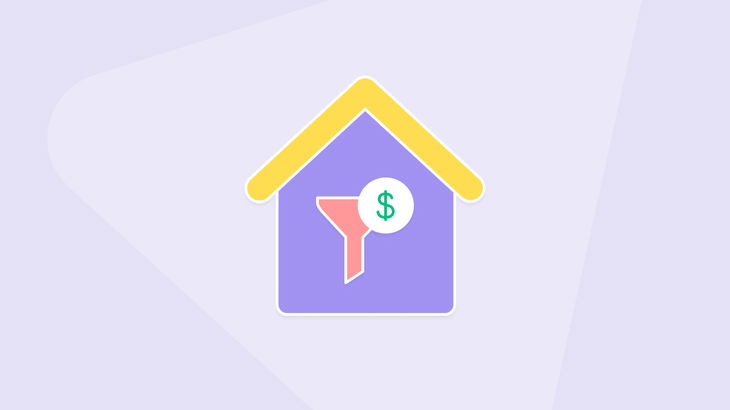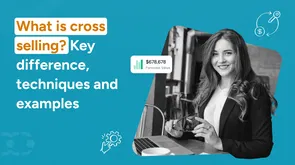Staging – Discuss this with your client, as 82% of buyers’ real estate agents said that staging a house helped the buyer better visualize the property.
2. Middle of the funnel – Follow-ups, price comparison, negotiation
Things are progressive at the middle of the funnel as all efforts are put in to take the deal to the next stage and close them.
Following up with clients – After the buyer visits, you need to follow up with them consistently. You can stay in touch with your prospects by executing automated email campaigns.
Pricing – While pricing, you need to complete a comparative market analysis and get an overall understanding of the market.
- Clients' expected price – You need to discuss with your client their expectation of sale value. At the same time, they present the market value to get an idea of a particular price range.
- Price comparison – Compare the location, features, and properties of similar size and age while performing the price comparison.
Negotiating
Here, you need to make sure to be clear and concise about the pricing discussion. Get a look at the below pointers.
Discuss offers with the buyer – You need to present your discussed offer (discussed with your client) to the buyer.
Accompany your client for the best price – Remember, you need to accompany your client to get the agreed list price or more than the list price. So, ensure that the buyer’s expectations are met at every sales funnel stage.
3. Bottom of the funnel – Deal closing
Now that you’ve filtered out your potential clients, it’s time to close the deal! Here are some of the closing stages.
Closing stages –
This is the last stage of your sales funnel. Here, you need to look after the mutual exchange of documentation. Make sure that both the buyer and seller have a clear understanding of the deal.
As their real estate agent, you must ensure the deal is closed smoothly without loopholes.
Closing is the last stage where the sales process is considered to be completed.
Scheduling inspection for buyer – You need to schedule a final inspection visit for the buyer to inspect the property thoroughly before closing the deal. If any serious problems exist, ask the seller to get it fixed for the new buyer.
Here, the buyer will inspect and bring the pointers that need modifications.
Manage the final negotiation – As a realtor, you need to handle this negotiation and lock a mutual deal price beneficial for your seller and then the buyer.
Exchange & sign contracts – This is the last step, where you must look after the proper exchange and handover of documents.
Importance of real estate sales funnel
Real estate sales need proper tracking of all the leads, which can be practiced only through an efficient real estate funnel.
Sales funnel is known to be an inseparable part of the sales process. Here are the reasons why:
1. Maximum deal closures
A sales funnel helps you have a count on all your leads and prospective buyers at every stage of the buyer’s journey. This means you have an account of all your buyers and sellers.
This time tracking will help you take effective next steps, and without missing any stage, you can close top deals and make good relations with your clients.
2. Analyze team performance
This helps your team to track their existing clients and close deals effectively. These enable a smooth process.
You can analyze your team’s efficiency by measuring your team’s actions. You can improvise, modify, or innovate processes to meet the desired results.
For example, you can track which leads move through the awareness stage to the consideration stage and which agent has closed more deals.
3. Accurate client data
It is very important to keep track of your clients in real estate sales. While preparing your client list or scheduling the buyer visit, you never miss any client.
When you add all your prospects and clients to your sales process, you can create a centralized database, hence capitalizing on every opportunity.
4. Forecast your sales
By analyzing past trends, keeping track of every deal, and engaging with clients, you can forecast how your real estate business will perform in the future.
Moreover, Sales Reports provide insights on which channels are bringing more clients, which deals are getting stuck at which stage, etc.
12 Unavoidable tips for managing your real estate sales funnel
Here are some tips that will help you become more than just a good realtor.
1. Prospecting
- While prospecting, you can reach more customers through emails, calls, and text messages.
- Make sure you meet your clients in person and do a background study of their property before you start your sales process.
2. Qualification
- Before qualifying your leads, you need to ensure that the client is interested in your property and it is not too early to classify them as your prospect. This will save a lot of time.
- While qualifying your leads, consider those prospects who tick all the items on the checklist. This checklist will consist of the staging items and will give you an accurate list of your potential buyers.
3. Scheduling visit
- While scheduling an open property visit, you can use CRM to select and prepare a list of potential buyers to send them an email using a template.
- Use an efficient CRM to send timely follow-up and reminder emails to your prospects regarding the property visit.
4. Negotiating
- While negotiating, update any offers on your website landing page. This will let the buyer know that the property is on offer and attract more interest.
- Be proactive, not reactive. Most people listen less and end up losing the deal. Hence, listen closely and with empathy.
- Your negotiation process will be more effective when executed in person rather than over a call. So, ensure that you schedule a meeting for negotiation.
5. Closing
- It is beneficial for the agent to understand the paperwork while closing the deal to avoid future problems.
- To close deals faster, set reminders and notifications to follow up with potential buyers.
- Lastly, nurture your leads even when the deal is closed. You can send personalized emails on different occasions so they can promote your business.
Automation of real estate sales process
After learning about the sales process, let’s learn how to ease the real estate sales process using automation.
1. Top of funnel automation
At the top of the funnel stages, automation enables you to build strong connections with clients, share promotional offers, listing notifications, etc.
Automation makes it easy for you and your team to contact clients through calls, text messages, and emails.
With features such as automated email & text follow-ups, you can send reminder notifications and follow-ups.
Instead of juggling multiple devices and tools, CRM with automation lets you work from a single platform.
You can use email & text campaigns, voicemail drops, automated workflows, and more features to simplify your tasks.
2. Middle of funnel automation
In the middle of the funnel, automation helps the team stay on track.
An ideal CRM with automation capabilities helps build a strong sales funnel for realtors, sellers, buyers, renters, and more.
It helps you track contracts, deals, and sales activities such as property showings, open houses, listings, follow-ups, and conversations.
CRM eliminates repetitive tasks like assigning leads, setting up notifications, sending greetings, scheduling closing tasks, and more.
When a prospect qualifies, you can list them in your MSL (Multiple Listing Service) and automatically notify clients, saving time.
Hence, automation eliminates time-consuming activities and allows reps to focus on selling and crushing their quotas.
3. Bottom of funnel automation
At the bottom of the funnel stage, automation offers great support and sales closure functions.
You can exchange contracts and get them e-signed, stay connected with your clients, and improve your conversion rate.
Moreover, you can nurture clients with automated sales sequences and create a loyal customer base.
Boost your real estate sales with Salesmate
One of the best ways to manage a real estate business is by managing your sales process through a CRM.
Salesmate is a CRM for realtors that helps at every stage of the sales process. Whether it’s managing the marketing funnel or sales funnel, you can leverage the powerful features of Salesmate to create a streamlined process.
Salesmate allows you to automatically collect all your leads from various listings and manage them together. It lets you manage your contacts, assign leads for your agent’s further segment, and capture them.
Here’s how you can improve your real estate sales funnel with Salesmate:
- Multiple communication channels (Built-In Calling, Text Messaging, Email)
- Sales Pipeline and Contact Management
- Marketing & Sales Automation
- Sales Cadences for automated follow-ups
- Automated Workflows
- Exchange documents & e-sign them with DocuSign integration
Want to know if Salesmate is the right fit for your real estate business? Get the 15-day free trial now!
Conclusion
Now that you’re well-acquainted with the concept of a real estate sales funnel, you can easily create one for your real estate agency. Moreover, with the right CRM for real estate, you can scale your business and grow revenue.







Real estate sales are not only trending and profitable but also challenging at the same time.
The real estate sales process can be long, frustrating, and unsecured when not done correctly.
In order to close deals, you need to build a strong real estate sales funnel. This makes the sales funnel a very significant part of the sales process.
Hence, the more effective your real estate funnel is, the better the sales process, ultimately leading to higher sales volume.
Moving ahead, this article gives a glimpse of the stages of a real estate sales funnel, its importance, and some unavoidable tips and tricks for realtors to excel in the real estate market.
What are the stages of real estate sales funnel?
The real estate sales funnel can be disorganized when done without following a specific process.
Below are stages of funnels that real estate agents can consider when creating a real estate marketing strategy.
1. Top of the funnel – Prospecting, listing, visits
Most realtors or real estate agents skip the initial steps of sales. The top of the funnel is the broader part, as it lets you initiate more engagement and increase brand credibility.
Also known as the awareness stage, this is the part where you need to make maximum marketing efforts for your real estate services.
Here’s how you can excel at creating awareness for your real estate agency or business.
Greetings and meets – As a realtor, one of the initial steps is to meet and greet the client to learn about their requirements. 88% of buyers have purchased their homes through a real estate agent.
Therefore, this step is essential when you’re creating real estate sales funnels.
Prospecting – This is the initial stage where you are searching for your potential buyer. You can approach various platforms or modes to get maximum potential and qualified leads in your list.
Also, you can reach out to your past clients, approach new prospects, and make a list including all of them.
You need to approach everyone on your list and ensure you don’t miss anyone.
Listing – You need to mention details about the property owner, the agent, and the property.
Adding the properties on real estate listing websites enables you to reach targeted real estate leads and improve your revenue. This step allows you to expand your real estate business in the local market.
Qualifications – Here, you need to set specific standards or qualifications to list potential buyers for whom you’ll be scheduling a visit.
Schedule visits – At this real estate sales funnel stage, you’ll schedule a visit to the property. You need to talk with your seller and the potential buyers to set a perfect time.
As a realtor, you must instruct your client to keep the property clean and presentable.
You can schedule a particular visit for individual prospects or schedule an open property visit. You need to provide all the details about the property to the potential buyers.
Managing your visits, you can share your calendar and availability with your clients so they can book meetings with you.
Schedule visits in a flash!
Book meetings faster and schedule real estate visits with Salesmate's Meeting Scheduler.
Staging – Discuss this with your client, as 82% of buyers’ real estate agents said that staging a house helped the buyer better visualize the property.
2. Middle of the funnel – Follow-ups, price comparison, negotiation
Things are progressive at the middle of the funnel as all efforts are put in to take the deal to the next stage and close them.
Following up with clients – After the buyer visits, you need to follow up with them consistently. You can stay in touch with your prospects by executing automated email campaigns.
Pricing – While pricing, you need to complete a comparative market analysis and get an overall understanding of the market.
Negotiating
Here, you need to make sure to be clear and concise about the pricing discussion. Get a look at the below pointers.
Discuss offers with the buyer – You need to present your discussed offer (discussed with your client) to the buyer.
Accompany your client for the best price – Remember, you need to accompany your client to get the agreed list price or more than the list price. So, ensure that the buyer’s expectations are met at every sales funnel stage.
3. Bottom of the funnel – Deal closing
Now that you’ve filtered out your potential clients, it’s time to close the deal! Here are some of the closing stages.
Closing stages –
This is the last stage of your sales funnel. Here, you need to look after the mutual exchange of documentation. Make sure that both the buyer and seller have a clear understanding of the deal.
As their real estate agent, you must ensure the deal is closed smoothly without loopholes.
Closing is the last stage where the sales process is considered to be completed.
Scheduling inspection for buyer – You need to schedule a final inspection visit for the buyer to inspect the property thoroughly before closing the deal. If any serious problems exist, ask the seller to get it fixed for the new buyer.
Here, the buyer will inspect and bring the pointers that need modifications.
Manage the final negotiation – As a realtor, you need to handle this negotiation and lock a mutual deal price beneficial for your seller and then the buyer.
Exchange & sign contracts – This is the last step, where you must look after the proper exchange and handover of documents.
Importance of real estate sales funnel
Real estate sales need proper tracking of all the leads, which can be practiced only through an efficient real estate funnel.
Sales funnel is known to be an inseparable part of the sales process. Here are the reasons why:
1. Maximum deal closures
A sales funnel helps you have a count on all your leads and prospective buyers at every stage of the buyer’s journey. This means you have an account of all your buyers and sellers.
This time tracking will help you take effective next steps, and without missing any stage, you can close top deals and make good relations with your clients.
2. Analyze team performance
This helps your team to track their existing clients and close deals effectively. These enable a smooth process.
You can analyze your team’s efficiency by measuring your team’s actions. You can improvise, modify, or innovate processes to meet the desired results.
For example, you can track which leads move through the awareness stage to the consideration stage and which agent has closed more deals.
Encourage your agents to perform better
Set clear and measurable goals for your real estate agents.
3. Accurate client data
It is very important to keep track of your clients in real estate sales. While preparing your client list or scheduling the buyer visit, you never miss any client.
When you add all your prospects and clients to your sales process, you can create a centralized database, hence capitalizing on every opportunity.
4. Forecast your sales
By analyzing past trends, keeping track of every deal, and engaging with clients, you can forecast how your real estate business will perform in the future.
Moreover, Sales Reports provide insights on which channels are bringing more clients, which deals are getting stuck at which stage, etc.
12 Unavoidable tips for managing your real estate sales funnel
Here are some tips that will help you become more than just a good realtor.
1. Prospecting
2. Qualification
3. Scheduling visit
4. Negotiating
5. Closing
Automation of real estate sales process
After learning about the sales process, let’s learn how to ease the real estate sales process using automation.
1. Top of funnel automation
At the top of the funnel stages, automation enables you to build strong connections with clients, share promotional offers, listing notifications, etc.
Automation makes it easy for you and your team to contact clients through calls, text messages, and emails.
With features such as automated email & text follow-ups, you can send reminder notifications and follow-ups.
Instead of juggling multiple devices and tools, CRM with automation lets you work from a single platform.
You can use email & text campaigns, voicemail drops, automated workflows, and more features to simplify your tasks.
2. Middle of funnel automation
In the middle of the funnel, automation helps the team stay on track.
An ideal CRM with automation capabilities helps build a strong sales funnel for realtors, sellers, buyers, renters, and more.
It helps you track contracts, deals, and sales activities such as property showings, open houses, listings, follow-ups, and conversations.
CRM eliminates repetitive tasks like assigning leads, setting up notifications, sending greetings, scheduling closing tasks, and more.
When a prospect qualifies, you can list them in your MSL (Multiple Listing Service) and automatically notify clients, saving time.
Hence, automation eliminates time-consuming activities and allows reps to focus on selling and crushing their quotas.
3. Bottom of funnel automation
At the bottom of the funnel stage, automation offers great support and sales closure functions.
You can exchange contracts and get them e-signed, stay connected with your clients, and improve your conversion rate.
Moreover, you can nurture clients with automated sales sequences and create a loyal customer base.
Boost your real estate sales with Salesmate
One of the best ways to manage a real estate business is by managing your sales process through a CRM.
Salesmate is a CRM for realtors that helps at every stage of the sales process. Whether it’s managing the marketing funnel or sales funnel, you can leverage the powerful features of Salesmate to create a streamlined process.
Salesmate allows you to automatically collect all your leads from various listings and manage them together. It lets you manage your contacts, assign leads for your agent’s further segment, and capture them.
Here’s how you can improve your real estate sales funnel with Salesmate:
Want to know if Salesmate is the right fit for your real estate business? Get the 15-day free trial now!
Conclusion
Now that you’re well-acquainted with the concept of a real estate sales funnel, you can easily create one for your real estate agency. Moreover, with the right CRM for real estate, you can scale your business and grow revenue.
Krish Doshi
SEO ExecutiveKrish Doshi is an SEO Specialist and content enthusiast at Salesmate, focused on optimizing content and driving digital growth. When he’s not working, he enjoys exploring new technologies and trends in digital marketing.